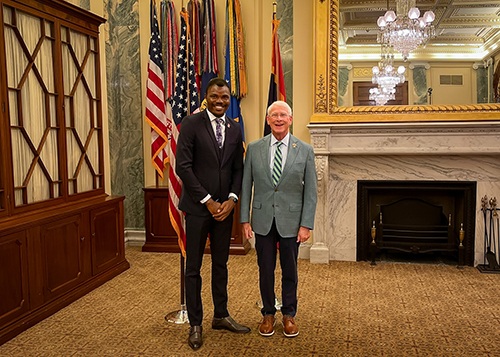MSU students, faculty collaborate to reduce the risks of antimicrobial resistance worldwide
Contact: Alaina Dismukes

STARKVILLE, Miss.—Mississippi State University is collaborating with global partners to reduce the risks of antimicrobial resistance worldwide for a safer and healthier tomorrow.
Seto Ogunleye, MSU doctoral candidate in veterinary medical science with a concentration in infectious disease and immunology, participated in the American Society for Microbiology Hill’s Day of Antimicrobial Resistance held this past fall in Washington, D.C. The event saw policymakers learn from scientists and experts the significance of innovative research to reduce the risks of antimicrobial resistance emerging and spreading in the U.S. and around the world.
“It is important that we fight together against resistant pathogens,” Ogunleye said. “This issue is important here and beyond the shores of America. It is a worldwide issue, which is why it is so important to have the support of policymakers, taking a One Health approach to enhance antimicrobial resistance-related research.”
Several factors contribute to the development of antimicrobial resistance.
“Antimicrobial resistance is a natural phenomenon that occurs when pathogens are exposed to antimicrobial agents, making it more likely that a pathogen will gain resistance over time,” he said. “Also, using an antibiotic in a lower dosage than prescribed will not be sufficient enough to kill the pathogens and can lead to resistance.
“It is important to promote the development of new types of antimicrobial agents to treat the pathogens, and to enhance adaptability and responsible use of antimicrobial agents. Additionally, vaccinations play an important role in fighting off pathogens from the start, so later treatment is not necessary.”
Hossam Abdelhamed, MSU College of Veterinary Medicine faculty member currently serving as principal investigator of a U.S. Department of Agriculture National Institute of Food and Agriculture project on antimicrobial resistance, said antimicrobial resistance is an important issue in many sectors of animal production, including aquaculture.
“Appropriate antimicrobial stewardship is critical to sustain efficacy of antimicrobial agents and ensure aquaculture producers have adequate treatment options for maximum production efficiency, profitability and sustainability,” Abdelhamed said.
MSU is leading the charge to reduce the burden of disease in the aquaculture industry through innovative tools and advancing antimicrobial resistance research. The university is home to a U.N. Food and Agriculture Organization Reference Center on Antimicrobial Resistance and Aquaculture Biosecurity through the MSU Global Center for Aquatic Health and Food Security, or GCAHFS, which is affiliated with the university’s College of Veterinary Medicine. The designation of MSU as an FAO Reference Center emphasizes the university’s expertise and global leadership in antimicrobial resistance and aquaculture biosecurity.
“MSU faculty, staff and students are working together with collaborators around the nation and the world to find innovative solutions to the threat of antimicrobial resistance,” said Stephen Reichley, head of the FAO Reference Center on Antimicrobial Resistance and Aquaculture Biosecurity, associate director of GCAHFS, and CVM faculty member. Abdelhamed and his lab have produced impressive and impactful results that are shaping our approach. Ogunleye’s participation in the ASM Hill’s Day of Antimicrobial Resistance is another fantastic example of the engagement of our graduate students in this work.”
To learn more about GCAHFS, visit www.gcahfs.msstate.edu. More information on the FAO Reference Center on Antimicrobial Resistance and Aquaculture Biosecurity can be found at www.gcahfs.msstate.edu/projects/fao-reference-center-antimicrobial-resistance-and-aquaculture-biosecurity.